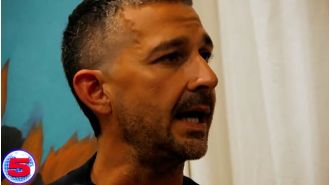Ball Arena helped Stan Kroenke gain access to land development in downtown Denver.
Neary, KSE's EVP of business operations, praises the Kroenkes' exceptional vision.

When Stan Kroenke became involved in a fierce battle for ownership of the Nuggets and Avalanche, it may have seemed like the land next to Pepsi Center was the least desirable aspect of the potential deal. The arena was brand-new, having been opened by the star-studded Avalanche team on October 13, 1999 with a win over the Bruins. For Kroenke, basketball was a passion, as his son Josh played for the University of Missouri team at the time.
Despite his love for sports, the 52-year-old businessman, known then as a Walmart heir, was not solely interested in team ownership. He was also a savvy real estate developer with aspirations to build in Denver. Purchasing the Nuggets, Avalanche, and their arena in 2000 gave him a valuable window into the downtown area, where he would eventually inherit a large expanse of parking lots.
Fast forward 24 years later, and the Denver City Council has approved a major development plan for those parking lots, to be carried out by Kroenke Sports & Entertainment (KSE), the parent company of the two sports franchises. This marks the beginning of a long-term plan envisioned by Kroenke when he first acquired the teams. "The Kroenkes have an extraordinary vision," said Mike Neary, KSE's executive vice president of business operations, "as it relates to professional sports and real estate." In a time where the future of the Broncos' home in Sun Valley is uncertain, the only privately constructed professional sports venue in Denver, now named Ball Arena, serves as an example of how team ownership has become intertwined with real estate development.
It took time for Kroenke to launch his master plan in Denver, but Ball Arena ultimately provided the catalyst for the development of a downtown corridor that will strengthen the bond between ownership and the city, while potentially generating billions of dollars for the Kroenke family. When Kroenke purchased the Nuggets and Avalanche from Ascent Entertainment, the $450 million deal included a commitment to keep the teams in Denver for the next 25 years. However, this commitment was not solely driven by a love for the city and its teams.
In 1997, Ascent had purchased the land for Pepsi Center and surrounding parking lots from a railroad company. As part of the negotiation to break the teams' lease at the city-owned McNichols Arena, the city assumed ownership of the land and agreed to give it back to the teams in 2023. When Kroenke bought the teams in 2000, he also inherited the ground lease and the rights to develop the 55-acre property.
Over the next 20 years, Denver's property values skyrocketed and areas surrounding sports venues became increasingly popular. When Kroenke relocated the Rams from St. Louis to Los Angeles in 2016, he chose a 300-acre site that offered opportunities for not just a stadium, but also office space, residences, restaurants, retail stores, and parks.
This comprehensive development approach is becoming more common among team owners looking to maximize their returns on investment. "I think both Ascent and Kroenke certainly understood the potential value of that much land in downtown Denver," said Art Aaron, who was general counsel for Ascent at the time of the sale. Unlike Coors Field and Empower Field at Mile High, Pepsi Center was not funded through a public tax referendum.
However, the private financing model used to build Ball Arena did come with tax breaks for ownership. According to Geoffrey Propheter, a professor at the University of Colorado Denver who studies stadium economics, this is a common practice for team owners. By turning the land over to the local government and leasing it back, owners can reduce or eliminate property tax bills.
This was the case for the KSE-owned Colorado Rapids' stadium in Commerce City and is also planned for the Philadelphia 76ers' proposed $1.3 billion arena. Ultimately, the Nuggets and Avalanche operated on a ground lease until 2019, with the teams owning the building but not the land underneath it. This arrangement allowed for lower property taxes and potential future development opportunities.
As Propheter puts it, "This notion that private construction of a facility is kind of like the Holy Grail of sports - that's misleading." With their ownership of Ball Arena and the surrounding land, the Kroenke family has positioned themselves to not only benefit from the success of their teams, but also from the development potential of the downtown area. Stan Kroenke, a successful businessman, had his sights set on more than just owning the Nuggets and Avalanche when he entered into a bidding war for them. He saw potential in the vacant land next to the newly built Pepsi Center, despite it seeming like the least desirable part of the purchase.
The arena itself was state-of-the-art and had been inaugurated by the star-studded Avalanche in 1999. Kroenke's son, Josh, was also a member of the University of Missouri basketball team at the time, making basketball a personal favorite for Kroenke. But Kroenke's interest in the teams and the arena was not solely for the love of sports.
As a savvy real estate developer, he had his sights set on building in Denver. His acquisition of the Nuggets, the Avalanche, and their arena in 2000 gave him a prime location on the edge of downtown, with an expanse of parking lots waiting to be developed. It was all part of his long-term plan for the city.
Nearly twenty-four years later, Denver City Council approved rezoning for a massive development project on those parking lots, to be executed by Kroenke Sports & Entertainment (KSE), the parent company of the teams. This was the kind of long-term vision that Kroenke had when he first purchased the franchises. According to Mike Neary, KSE's executive vice president of business operations, the Kroenkes have an extraordinary vision for both professional sports and real estate.
In a time where the future of the Broncos' home in Sun Valley is uncertain, the privately constructed Pepsi Center (now named Ball Arena) stands as an example of how team ownership has become intertwined with real estate development. Kroenke had to be patient, but his master plan for Denver was finally coming to fruition. The development of a downtown corridor around Ball Arena will strengthen the bond between ownership and the city, while also potentially generating billions of dollars for the Kroenke family.
When Kroenke purchased the Nuggets and Avalanche from Ascent Entertainment in 2000, he made a commitment to keep the teams in Denver for the next 25 years, which helped secure the $450 million sale. But this commitment was not made solely out of loyalty. Ascent had purchased the land for Pepsi Center in 1997 and deeded it back to the city as part of the negotiations to get out of their lease at McNichols Arena.
This meant that when Kroenke bought the teams, he also inherited the rights to the land, which would become an oasis for real estate development. As the years went by, Denver property values skyrocketed and districts around sports venues became increasingly popular. Kroenke's relocation of the Rams from St.
Louis to Los Angeles in 2016 was not just about building a new stadium, but also taking advantage of the development opportunities surrounding it. This trend of maximizing returns on investment through real estate development is becoming more common among team owners, such as the Philadelphia 76ers and the KSE-owned Colorado Rapids. While the privately financed Ball Arena did not use a public tax referendum for its construction, Kroenke still received tax breaks through a ground lease with the city.
This model of renting or leasing land from a local government instead of owning it allows owners to reduce or eliminate property tax bills. The Nuggets and Avalanche used this model until 2019, when they finally acquired ownership of the land under their arena. In the end, Kroenke's purchase of the Nuggets, the Avalanche, and the arena was not just about owning sports teams.
It was a strategic move to secure a prime location for real estate development in downtown Denver. And with the recent approval of the massive development project, it seems that Kroenke's vision and patience have paid off, with the potential for both financial success and a stronger relationship between the teams and the city.










